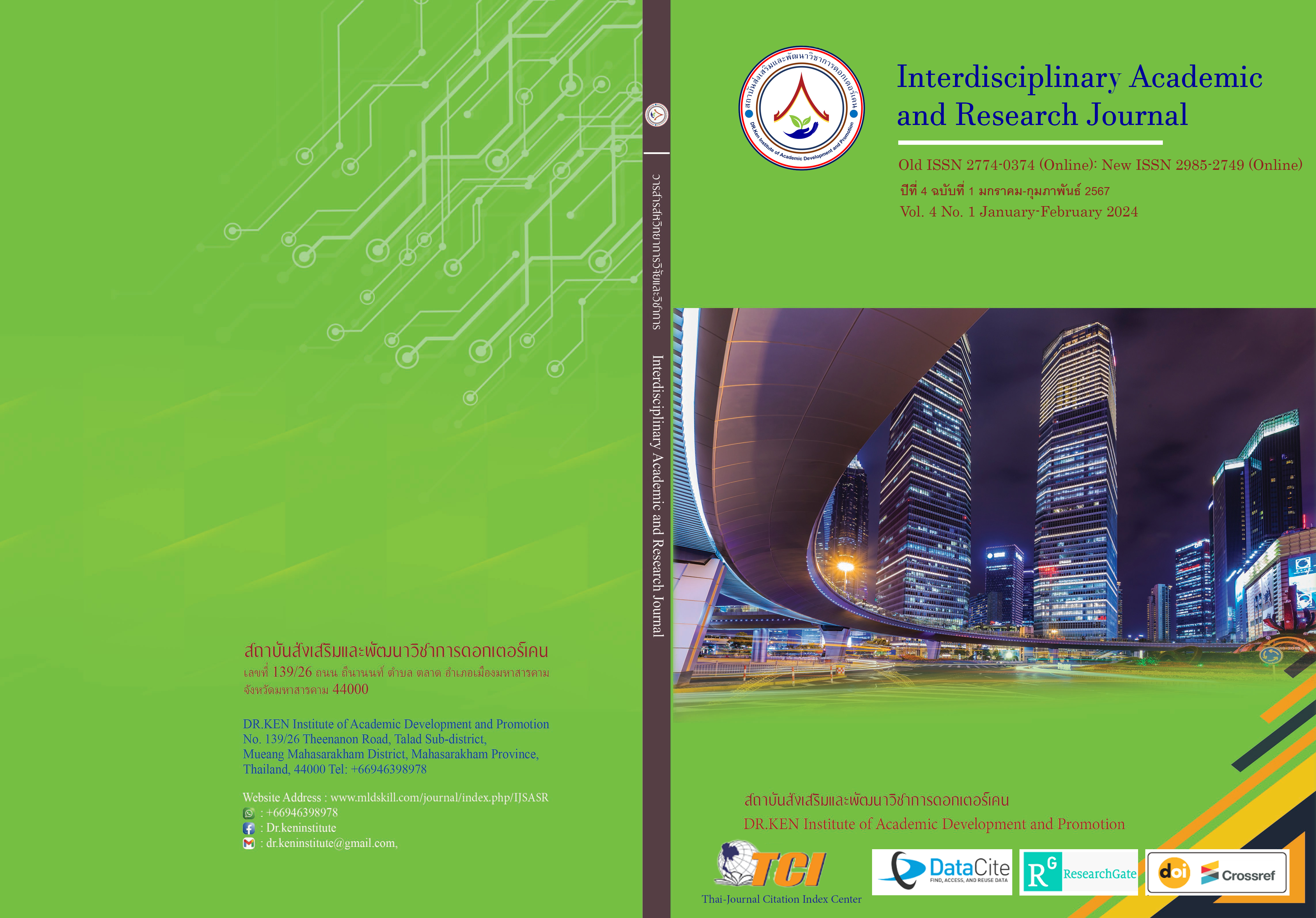Assessment of Needs Assessment in the Administration of Educational Institutions According to Principles of Good Governance of Educational Institutions under the Office of Administration Private Vocational Education Chachoengsao Province
DOI:
https://doi.org/10.60027/iarj.2024.271928Keywords:
Needs Assessment; , Good Governance; , Public MediaAbstract
Background and Aims: Educational institution administration if the principles of good governance are applied in the context of the educational institution. It will make the administration efficient effective and successful. The objectives of this research are to 1) study the current and desired conditions, 2) study the needs assessment, and 3) study the guidelines for educational institution administration. According to the principles of good governance of educational institutions under the Private Vocational Education Administration Office Chachoengsao Province.
Methodology: The population and sample included administrators and teachers in educational institutions under the Private Vocational Education Administration Office. Chachoengsao Province Number The sample size was determined using Krejcie and Morgan tables. The sample size was 118 people, sampled using stratified random sampling. Tools used to collect data as a questionnaire with a confidence value of 0.96. Data were analyzed using ready-made computer programs. Statistics used include frequency (Frequency), percentage (Percentage), mean (Mean), standard deviation (Standard Deviation), and the need index (PNI modified).
Results: (1) The current condition of educational institution administration according to the principles of good governance at a high level in order of the average values, it is the aspect of responsibility and morality. The aspect with the lowest average is the aspect of transparency. and the desired conditions of educational institution administration according to the principles of good governance. at the highest level Arranged from highest to lowest as follows: moral principles The principles of participation and transparency. (2) Necessary needs of educational institution administration according to the principles of good governance. It was found that the aspect that is of first importance is Integrity (PNI modified=0.32), followed by participation and value for money (PNImodified=0.31) The least important aspect is Responsibility aspect (PNImodified=0.29). (3) Guidelines for school administration based on good governance found that in terms of jurisprudence, administrators encourage teachers and personnel to be able to perform duties by the rules and regulations with fairness. Being a good role model in conducting oneself, clarifying to personnel about rules and regulations regarding morality. Administrators must be good role models and continually support and promote morals and ethics within educational institutions. There is continuous and fair performance appraisal in terms of transparency, management must be done openly and verifiably, and there is a committee to supervise the budget, income expense, finance, supplies, procurement, and participation. Administrators give opportunities to the public, teachers, personnel, establishments, and stakeholders to participate in the recognition Participate in expressing opinions in setting policies. and decision Together in developing educational institutions in terms of responsibility, administrators must create awareness and recognition of rights, duties, roles, responsibilities, and tasks as assigned and have a performance reporting system. Promote and support training Continuously develop teachers and personnel in educational institutions and in terms of value for money, policies must be established to work efficiently, economically, and worthwhile. Create a culture of innovation in educational institutions by encouraging teachers and personnel to generate ideas. How to perform work economically and cost-effectively, taking into account the maximum benefits for students.
Conclusion: Assessment of school administration reinforces a strong foundation of responsibility and morality. Transparency is specified as a guideline for improvement. Conditions requiring emphasis on moral principles Participation and transparency Important management requirements emphasize honesty. Participation and value by calling for continuous development. The stated guidelines encourage administrators to protect fairness. Behavior according to ethical principles and inclusivity to increase responsibility Promoting awareness Using a performance reporting system and support for ongoing training is essential. The overarching aim is to create policies that promote efficiency, innovation, and cost-effectiveness. This is in line with the principles of good corporate governance for the maximum benefit of students.
References
ขันแก้ว พรมคำ. (2565). การพัฒนาแนวทางการบริหารโดยใช้หลักธรรมาภิบาลของสถานศึกษา สังกัดองค์กรปกครองส่วนท้องถิ่นจังหวัดเลย. วิทยานิพนธ์การศึกษามหาบัณฑิต: มหาวิทยาลัยมหาสารคาม.
จิณห์วรา วันทาและคณะ. (2562). การศึกษาความต้องการจําเป็นในการบริหารงานตามหลักธรรมาภิบาลของผู้บริหารสถานศึกษา กลุ่มเมืองสําโรงขามป้อม สังกัดสํานักงานเขตพื้นที่การศึกษาประถมศึกษาอุบลราชธานีเขต 4. (วิทยานิพนธ์การศึกษามหาบัณฑิต). มหาวิทยาลัยราชธานี.
จุฑากาญจน์ เก่งกสิกิจ. (2564). การใช้หลักธรรมาภิบาลของผู้บริหารสถานศึกษาในสหวิทยาเขตธรรมจักรสังกัดสำนักงานเขตพื้นที่การศึกษามัธยมศึกษา เขต 5. วิทยานิพนธ์ศึกษาศาสตรมหาบัณฑิต: มหาวิทยาลัยศิลปากร.
ชัยอนันต์ สมุทวณิช. (2550). Good Governance กับการปฏิรูปการศึกษาการปฏิรูป การเมือง. มปส
ณัฐฐิภา ลาสงยางและคณะ (2564). ความต้องการจำเป็นของการบริหารสถานศึกษาตามหลักธรรมาภิบาลของผู้บริหาร สถานศึกษา สังกัดสำนักงานเขตพื้นที่การศึกษาประถมศึกษาเลย เขต 2. Journal of Buddhist Education and Research. 7(2), 77-88.
ทัศพร เกตุถนอมและคณะ (2565). การบริหารงานตามหลักธรรมาภิบาลของผู้บริหารสถานศึกษาสังกัดอาชีวศึกษา จังหวัดแพร่. วารสารมหาจุฬานาครทรรศน์. 9(6), 1-15.
ธีรยุทธ บุญมี (2551).การปฏิวัติสัญศาสตร์ของโซซูร์เส้นทางสู่โพสต์โมเดอร์นิสม์. กรุงเทพฯ : วิภาษา.
ธีระ รุญเจริญ. (2550). ความเป็นมืออาชีพในการจัดและบริหารการศึกษา. ยุคปฏิรูปการศึกษา. กรุงเทพฯ: ข้าวฟ่าง.
บวรศักดิ์ อุวรรณโณ. (2545). การสร้างธรรมาภิบาล (Good Governance) ในสังคมไทย. กรุงเทพฯ: วิญญูชน.
บุญชม ศรีสะอาด. (2556). การวิจัยเบื้องต้น. (พิมพ์ครั้งที่ 9). กรุงเทพฯ : สุวีริยาสาส์น.
บุษบง ชัยเจริญวัฒนะ และบุญมี ลี้. (2554). ตัวชี้วัดธรรมาภิบาล. (พิมพ์ครั้งที่ 2). กรุงเทพฯ : สำนักพิมพ์คุรุสภาลาดพร้าว.
ปนัดดา ดิศกุล. (2560). คุณธรรม จริยธรรมสำหรับผู้บริหารและสถานศึกษาคุณธรรม. Retrieved from: https://www.kroobannok.com/81505
ภัทรดี เหมะ. (2565). แนวทางการบริหารตามหลักธรรมาภิบาลของผู้บริหารสถานศึกษา สังกัดเทศบาลนครนครสวรรค์ จังหวัดนครสวรรค์. วิทยานิพนธ์ครุศาสตรมหาบัญฑิต: มหาวิทยาลัยราชภัฏนครสวรรค์.
สถาบันพระปกเกล้า. (2544). ตัวชีวัดธรรมาภิบาล. กรุงเทพฯ : สถาบันพระปกเกล้า.
สำนักงานคณะกรรมการอาชีวศึกษา. (2565). ข้อมูลสถานศึกษาอาชีวศึกษาเอกชนที่เปิดทำการสอน ปีการศึกษา 2565. Retrieved from: https://vecp.vec.go.th/schoolinfo.aspx
Downloads
Published
How to Cite
Issue
Section
License
Copyright (c) 2024 Chanchai Sripinyo, Ganratchakan Lertamornsak

This work is licensed under a Creative Commons Attribution-NonCommercial-NoDerivatives 4.0 International License.
Copyright on any article in the Interdisciplinary Academic and Research Journal is retained by the author(s) under the under the Creative Commons Attribution-NonCommercial-NoDerivatives 4.0 International License. Permission to use text, content, images, etc. of publication. Any user to read, download, copy, distribute, print, search, or link to the full texts of articles, crawl them for indexing, pass them as data to software, or use them for any other lawful purpose. But do not use it for commercial use or with the intent to benefit any business.
















.png)


